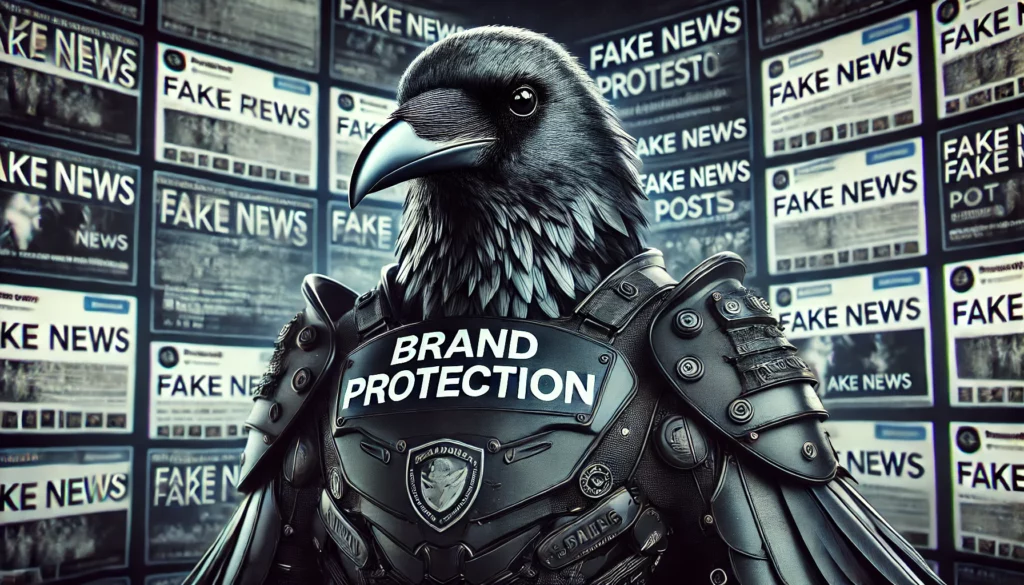The Importance of Web Monitoring for Brand Protection
The internet is a double-edged sword for companies and brands. Here's how to protect your organization.

The internet is a double-edged sword for companies and brands. While it offers unparalleled opportunities for brand amplification and engagement, it also presents significant challenges, particularly regarding narrative attacks that could cancel your brand. The rapid spread of narrative attacks can damage a company’s reputation, impact financial performance, undermine consumer trust, and pose security threats. Whether it’s a deepfake of your CEO or a staged faulty product, fake news that results in headlines can – and has – hurt a company’s revenue, negatively impact stock prices, and create a PR nightmare. To reduce these risks, businesses must actively engage in web monitoring to track online narratives and protect their interests.
Last year, The CEO of Bud Light’s parent company, Michel Doukeris blamed online misinformation for the controversy surrounding its marketing with transgender influencer Dylan Mulvaney. Bud Light sales were down over 20% by the end of April, according to an Associated Press report. According to Doukeris, narrative attacks that was spread online made people believe cans with Mulvaney’s face were being rolled out for sales across the US, when only one souvenir can had been produced and sent to the influencer.
Another example of the importance of web monitoring comes from the Yellow Jacket protests in France. Social media has been blamed for a dip in tourism in France after “yellow jacket” protests by social activists were magnified in videos shared on YouTube that gave the impression the destruction was more widespread than previously believed. “Large multinationals are natural targets for narrative attacks. When breaking news happens, it’s key to have teams and partners who carefully monitor and address insights from social media,” said the head of SNCF International, Diego Diaz, in the aftermath of the incident.
According to Gail Heimann, CEO of Weber Shandwick public relations firm, “As malicious content becomes more pervasive and more sophisticated, it presents an increasingly material reputational and commercial threat, The Weber Shandwick Media Security Center team works to understand the influence of questionable content on the attitudes and behaviors of customers, employees and other stakeholders. And, building on an already world-class crisis and issues practice, aims and to better anticipate, manage and mitigate those threats”
Web monitoring involves tracking narratives about your business, brand, and executives across all digital platforms and places. Learn more about web monitoring and its key to protecting your brand and business.
Why Web Monitoring Matters
1. Reputation Management
A company’s reputation is one of its most valuable assets. In an era where information spreads rapidly across social media and news platforms, a single piece of misinformation can go viral and cause lasting damage. Web monitoring enables businesses to identify false narratives about their brand or executives and respond swiftly with accurate information.
2. Crisis Prevention and Management
Web monitoring helps detect potential crises early, allowing companies to take preemptive measures to mitigate the impact. By tracking company mentions across various online channels, businesses can identify emerging issues and respond with timely statements or corrective actions.
3. Identifying Security Threats
Beyond reputation management, web monitoring is crucial for identifying potential security threats. Cybercriminals often exploit narrative attacks to execute phishing attacks, data breaches, or identity theft. Monitoring online discussions can help companies spot these threats and implement necessary security measures to protect sensitive information.
4. Competitive Analysis
Web monitoring also provides valuable insights into competitors’ activities and industry trends. Businesses can identify competitive threats and opportunities by analyzing online conversations and narratives, allowing them to adjust their strategies accordingly.
5. Narrative Intelligence
Narrative intelligence helps organizations assess their risk exposure and develop strategies to protect against these risks. Narrative Intelligence enables organizations to:
- Reduce complexity, discovery, and time needed to resolve narrative analysis.
- Eliminate the need for deep technical skills to understand risk.
- Facilitate prioritization and review of narratives based on impact and risk.
- Provide easy-to-understand summaries and context-checked information.
- Highlight top posts, engagement metrics, and accounts driving the narrative.
- Easily share with management and executive teams.
- Enable deeper analysis of narratives with a few clicks
- Help you make better strategic decisions, especially in times of crisis.
How to Effectively Monitor the Web
To successfully monitor the web and protect your company, consider implementing the following strategies:
1. Utilize Web Monitoring Tools
Invest in web monitoring tools that track narratives, keywords, and sentiment analysis across social media, news sites, blogs, and forums. Monitor attacks from all angles so that you can predict, prepare, and understand threats to gain control over your narrative.
2. Visualize Relevant Narratives, Keywords and Phrases
Identify specific narratives, keywords, and phrases relevant to your brand, products, executives, and industry. Regularly monitor these terms to detect any emerging or potential threats.
3. Engage with Your Audience
Actively engage with your audience on social media and other online platforms. Responding to questions, concerns, or false information with counter-narratives demonstrates transparency and builds consumer trust.
4. Collaborate with Public Relations and Security Teams
Coordinate efforts between your PR and security teams to ensure a unified approach to addressing narrative attacks and security threats. Develop clear protocols for responding to crises and disseminating accurate information internally and externally.
5. Regularly Update Crisis Management Plans
Maintain and regularly update a crisis management plan that outlines the steps to take in the event of narrative attacks. Include contact information for key personnel and external partners who can assist in managing the crisis.
Protect You Businesses Narrative with Blackbird.AI
Information spreads like wildfire online. Web monitoring is essential for protecting against financial, reputational, and operational harm. By proactively tracking online narratives and engaging with your audience, you can mitigate the risks associated with narrative attacks. Investing in robust web monitoring strategies, including narrative intelligence, ensures that your brand and executives remain resilient in the face of cyber threats.
With Blackbird.AI, you can uncover emerging narratives, ensuring real-time insights that surpass social listening tools providing continuous visibility into evolving online conversations. Start monitoring the web for active threats today and protect your brand. See Blackbird.AI in action now.
Need help protecting your organization?
Book a demo today to learn more about Blackbird.AI.



